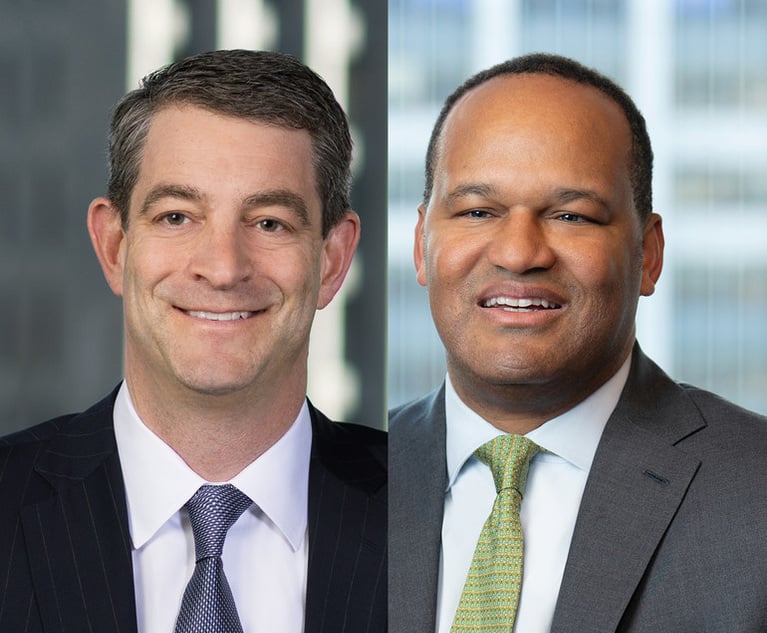The Problem With Associate Evaluations
Vague messages and limited guidance make evaluations a frustrating experience for many associates, especially women.
September 21, 2018 at 11:32 AM
7 minute read

The annual season of worry for associates has arrived. Self-evaluations will be prepared in earnest, and firms will send reminder emails to partners, urging them to fill out their associate evaluation forms. As associates enter into their evaluation meetings with those responsible for their future at the firm, the results can be dishearteningly predictable. Partners emerge from the meetings pleased with a productive conversation, while associates often feel frustrated by what they see as vague messages and limited guidance.
For women, in particular, the mixed messages and lost opportunities that are part of so many evaluation sessions are a precursor to attrition. Law firms increasingly speak about their commitment to gender equality, but the institutional changes required to turn words of commitment into results still fall short. The proof is the continued low percentage of women in equity partner roles and the lack of gender equity in compensation.
The evaluation process serves as a critical starting point to effect real change. In my training work, I have many opportunities to speak with associates in firms of all sizes, and hear frequent examples of their evaluation experiences.
Andrea (all names are changed) was a new associate who worked long hours, read avidly about how to be a successful lawyer, and looked forward to her first review as a learning opportunity. Her eagerness quickly faded to dismay, however, as she emerged from her first evaluation with no sense of how she was progressing. The review did not provide insight into the quality of her work, except for a generalized comment about her hours. Instead, the focus was on her personality, and whether she exuded enough confidence.
As a new lawyer, the comment took Andrea by surprise. Although generally confident in her own abilities, she wondered how someone fresh out of law school can properly exude the right amount of confidence when everything is uncharted territory? And what, exactly, does confidence look like to the reviewer? Yet Andrea's story is emblematic of the experiences of young women throughout the profession who report comments on their confidence level that do not match their view of themselves as secure individuals.
Maria is a senior associate who has similarly been told in her evaluation meetings that she lacks sufficient confidence. The irony, however, is that Maria also has a reputation among her colleagues as sometimes appearing too assertive and abrasive. Her overall evaluation experiences have been that she is always too different from what she should be in the eyes of those judging—never just right.
At Alicia's evaluation, she was told she does not speak up enough, and that she should ask more questions when given assignments. Since this was contrary to her own self-perception, Alicia asked for examples, but the evaluator had difficulty offering specifics. Moreover, one of Alicia's associate colleagues reported that, at her evaluation, she was criticized for asking too many questions when assigned new work, demonstrating a lack of self-confidence. So which is it: ask more questions when receiving an assignment or fewer?
At Monica's review, the partner complained about her lack of verbal participation at a meeting she attended with the client. That puzzled Monica because she was invited to that meeting as an opportunity to observe partner-client interactions. Monica did not show her anger at this example, for fear she would then be labeled as difficult. Instead, she wondered what would have happened at that client meeting had she, as a junior associate, dared speak up after being told she was invited for learning purposes. The trap had been set and she was caught within it no matter how she responded.
When Jennifer was told she needed to work on her demeanor, she had no idea how to respond. She tried to ask a few questions, as gently as possible so she did not appear closed to criticism. No examples were provided to shed light on the vague, subjective commentary that was her evaluation. Finally, at a loss for specifics, the partner suggested that an aspect of how she was viewed may be because she was young looking. How does one respond to that criticism?
There's a funny thing about Jennifer's situation. She was, indeed, young. That was clear when she was hired as a new law school graduate. So how could she be, in effect, viewed negatively because she looked her young age?
Based on the experiences of her colleagues, Sandra had little hope that she would learn from her vague evaluation, so she was anxious to complete the conversation and go back to work. But then she was asked an impossible question. When she was hired, Sandra expressed interest in a particular specialty, but because of the firm's limited workload in that area, she was placed in a different practice group whose leader conducted the evaluation. At the end of the evaluation, Sandra was asked if she still had an interest in the other specialty.
Sandra was well aware that partners highly value loyalty, and any passing interest in another partner's work could be cause for diminished assignments—both in quantity and quality. While her interest in the other specialty had not waned, she felt that an honest answer to the question could risk this partner's engagement in her career development.
These are just a few of the many examples female associates have shared where substantive evaluation comments were perfunctory, rather than illustrative. Instead, they provided subjective feedback that focused on vague personality traits and intangible qualities, leaving little opportunity to learn from the review session.
The associates were then placed in an impossible position. If they sought a greater understanding of the comments made, or offered their own perspective, they felt at risk of facing a worse indictment: being labeled as difficult. This was not an irrational fear; rather, it was based on the often-repeated experiences of others who had undergone similar evaluation experiences.
Firms that lament their high attrition rate among women should consider a neutral review of their evaluation process. Do the written evaluations reveal a subtle—and sometimes blatant—difference in the language used to evaluate women, compared with their male colleagues? Are the same standards used in commenting upon the work of similarly situated men and women? How frequently are men referred to as “superstars”? How frequently do evaluations question a woman's commitment, confidence or work ethic?
The evaluation process plays a key role in how people feel about their long-term opportunities in a firm. Vague negative statements made during evaluations that offer no specifics or examples do not contribute to associate development. Subjective assessments are poor substitutes for detailed examples of work quality. Nor do they send a message to associates that their professional development is important to the firm.
Firms with detailed evaluation policies are not immune. Associates in global firms also describe perfunctory evaluation meetings with limited substantive feedback. They similarly experience a focus on subjective qualities that are too vague to be useful and sometimes disclose an antiquated view of cultural norms and gendered behaviors.
Lawyers that are capable of solving critically urgent problems for their clients should be equally capable of investing time in an evaluation process that will make their firm stronger by developing a deeper talent pool. To do this successfully, however, requires as strong a commitment to associate growth and retention as the commitment to solving client problems.
Law firms need a vibrant future talent pool to maintain excellence in client service. For real change, firms must equate associate development with client service and retention. Institutional sustainability should provide a strong incentive for an evaluation process that contributes to excellence in talent development.
Lauren Stiller Rikleen is president of the Rikleen Institute for Strategic Leadership.
This content has been archived. It is available through our partners, LexisNexis® and Bloomberg Law.
To view this content, please continue to their sites.
Not a Lexis Subscriber?
Subscribe Now
Not a Bloomberg Law Subscriber?
Subscribe Now
NOT FOR REPRINT
© 2025 ALM Global, LLC, All Rights Reserved. Request academic re-use from www.copyright.com. All other uses, submit a request to [email protected]. For more information visit Asset & Logo Licensing.
You Might Like
View All
'None of Us Like It': How Expedited Summer Associate Recruiting Affects Law Students and the Firms Hiring Them

Latham's Lateral Hiring Picks Up Steam, With Firm Adding Simpson Practice Head, Private Equity GC
3 minute read

Leaning Into ‘Core’ Strengths, Jenner’s Revenue Climbs 17%, Profits Soar 23%
4 minute readTrending Stories
- 1Haynes and Boone Expands in New York With 7-Lawyer Seward & Kissel Fund Finance, Securitization Team
- 2Upstart Insurer That's Wowing Industry Hires AIG Legal Exec to Help Guide Global Expansion
- 3Connecticut Lawyers in Spotlight for Repping FBI Agents
- 4SEC Sued for Failing to Reveal Records Involving Simpson Thacher Attorney
- 5Lawsuit Accuses University of California of Racial Discrimination in Admissions
Who Got The Work
J. Brugh Lower of Gibbons has entered an appearance for industrial equipment supplier Devco Corporation in a pending trademark infringement lawsuit. The suit, accusing the defendant of selling knock-off Graco products, was filed Dec. 18 in New Jersey District Court by Rivkin Radler on behalf of Graco Inc. and Graco Minnesota. The case, assigned to U.S. District Judge Zahid N. Quraishi, is 3:24-cv-11294, Graco Inc. et al v. Devco Corporation.
Who Got The Work
Rebecca Maller-Stein and Kent A. Yalowitz of Arnold & Porter Kaye Scholer have entered their appearances for Hanaco Venture Capital and its executives, Lior Prosor and David Frankel, in a pending securities lawsuit. The action, filed on Dec. 24 in New York Southern District Court by Zell, Aron & Co. on behalf of Goldeneye Advisors, accuses the defendants of negligently and fraudulently managing the plaintiff's $1 million investment. The case, assigned to U.S. District Judge Vernon S. Broderick, is 1:24-cv-09918, Goldeneye Advisors, LLC v. Hanaco Venture Capital, Ltd. et al.
Who Got The Work
Attorneys from A&O Shearman has stepped in as defense counsel for Toronto-Dominion Bank and other defendants in a pending securities class action. The suit, filed Dec. 11 in New York Southern District Court by Bleichmar Fonti & Auld, accuses the defendants of concealing the bank's 'pervasive' deficiencies in regards to its compliance with the Bank Secrecy Act and the quality of its anti-money laundering controls. The case, assigned to U.S. District Judge Arun Subramanian, is 1:24-cv-09445, Gonzalez v. The Toronto-Dominion Bank et al.
Who Got The Work
Crown Castle International, a Pennsylvania company providing shared communications infrastructure, has turned to Luke D. Wolf of Gordon Rees Scully Mansukhani to fend off a pending breach-of-contract lawsuit. The court action, filed Nov. 25 in Michigan Eastern District Court by Hooper Hathaway PC on behalf of The Town Residences LLC, accuses Crown Castle of failing to transfer approximately $30,000 in utility payments from T-Mobile in breach of a roof-top lease and assignment agreement. The case, assigned to U.S. District Judge Susan K. Declercq, is 2:24-cv-13131, The Town Residences LLC v. T-Mobile US, Inc. et al.
Who Got The Work
Wilfred P. Coronato and Daniel M. Schwartz of McCarter & English have stepped in as defense counsel to Electrolux Home Products Inc. in a pending product liability lawsuit. The court action, filed Nov. 26 in New York Eastern District Court by Poulos Lopiccolo PC and Nagel Rice LLP on behalf of David Stern, alleges that the defendant's refrigerators’ drawers and shelving repeatedly break and fall apart within months after purchase. The case, assigned to U.S. District Judge Joan M. Azrack, is 2:24-cv-08204, Stern v. Electrolux Home Products, Inc.
Featured Firms
Law Offices of Gary Martin Hays & Associates, P.C.
(470) 294-1674
Law Offices of Mark E. Salomone
(857) 444-6468
Smith & Hassler
(713) 739-1250










